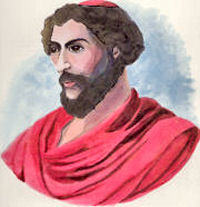“The Son of Man has authority on earth.” (Luke 5:24)
We don’t have to wonder what Jesus was trying to say to the people who witnessed his healing and forgiveness of the man lowered through the roof. He made it perfectly clear: he is someone with authority.
Jesus has authority over sin. Who can forgive sins but God alone? Of course, no one else can. That’s why it shocked everyone within earshot when Jesus told the man: “Your sins are forgiven.” In this passage, Jesus shows us that he has the power to remove the stain of sin and make us right before God. Not only does he wipe the slate clean; he can set us free from sinful habits that continue to trip us up—patterns like moodiness or a sharp tongue. He can break the power of guilt and shame over our past so that we can see how bright a future he has in store for us. All this because Jesus took our sin and disarmed it, nailing it to his cross (Colossians 2:14-15). Now that’s authority!
Jesus has authority over sickness. When some Pharisees objected to Jesus’ statement of forgiveness, he proved his authority by healing the man as well. If he could restore atrophied muscles and reknit weakened bones with just a word, surely he could remove sin as well! You may know someone who has been healed through prayer, whether it was at a healing Mass, at a prayer meeting, or in some other venue. Some of these healings are dramatic, like cancer remission, and some are more modest, like relief from a headache! But no matter how big or small, there are people around us who can testify that Jesus is still in the business of healing.
Jesus doesn’t exercise his authority like a tyrant. He isn’t motivated by greed or a lust for power. No, he is a wise ruler, a just king, a merciful sovereign. We have nothing to fear from him. There is no need to avoid him or try to set ourselves up as a rival to his throne. In fact, coming under his authority is the most sensible thing we could do. Who else can forgive our sins and heal our hearts?
“Lord Jesus, I believe that you are Lord and God. Come and reign over me; I want to spend my days in the shelter of your authority.”
Isaiah 35:1-10; Psalm 85:9-14
